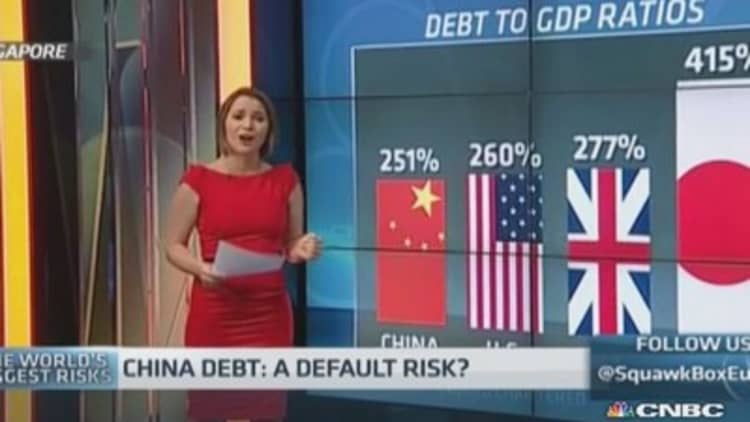China's debt loads have long loomed as a serious economic risk, and while analysts say new plans to clean up local government borrowing will bring near-term pain, a longer-term fix may be in sight.
"[The new plan] represents the first concrete step by the central government to clean up the debt problems at the local governments," analysts at Bernstein Research said in a note Friday.
Read More China's parliament authorizes local governments to issue bonds
Provincial governments' debt, often issued via local government financing vehicles, or LGFVs, has worried economists for years. Outstanding debt climbed to around 17.9 trillion yuan ($2.92 trillion) by the end of the first half of 2013, according to the most recent national audit, from around 10.7 trillion in 2010.

On Thursday, China's State Council, its highest authority, set quotas on the amount of debt that local governments can issue, required it to be used for public projects rather than operational spending and tied debt levels to local officials' performance reviews. It also barred local governments from using LGFVs and state-owned enterprises (SOEs) to raise debt and from guaranteeing or covering the liabilities of financial institutions or local corporates.
Read More China's local government debt burden varies widely: Moody's
"It's a tick in the right box," said Freya Beamish, an economist at Lombard Street Research, noting it indicates Beijing is willing to accept slower growth as a step toward avoiding an "Armageddon" scenario over its debt.
"While this may bring short-term pain in terms of slowing economic growth and accelerating credit losses at LGFVs, we think the reform will benefit the economy and the Chinese banking sector in the long term," Bernstein said.
It expects the reforms will weaken economic growth in debt-laden provinces as they incorporate existing and new debt into their budgets, as well as spurring an increase in the number of defaults among existing LGFV and local SOE debts.
Read More 'Perfect storm' to hit China economy in 2016
But on the flip side, Bernstein expects more discipline in local government borrowing and budgets and reduced reliance on shadow banking.
OCBC echoes the "short-term pain, long-term gain" view, seeing positives in separating government from corporate debt.

"There is no clear cut [line] between local government debt and corporate debt," Tommy Xie, an economist at OCBC, said in a note Thursday.
"The switch of funding channel from local government funding vehicles to a more transparent bond market will be positive for the development of onshore bond market," Xie said. "Given the leverage ratio is likely to be shifted from the corporate sector to sovereign under the reform, coupled with other reform, this may help lower the funding costs for the real economy."
Read More Commentary: China's economy is not experiencing a hard landing
To be sure, there were some grains of salt to go with the positives.
Lombard's Beamish believes the cap on local government debt doesn't go far enough.
"That's the easy part," said Beamish, who has been bearish on China's outlook. She's looking for tougher reforms, such as liberalizing interest rates and the capital account.
She's also concerned that the cap on debt just sets another control on the local governments.
Read More Why China property isn't facing Armageddon
"The reason all this shadow banking arose around local governments was that they had unpleasant [growth] targets they couldn't meet without taking on debt," when they weren't allowed to issue bonds, she noted, adding she's concerned the caps will spur local officials to search for other financing routes.
Others cautioned that while the changes are important, there won't be any instant results.
"All of this debt on their balance sheets won't be converted to [bonds] within 12 months," said Debra Roane, a senior credit officer at Moody's Investor Service.
—By CNBC.Com's Leslie Shaffer; Follow her on Twitter @LeslieShaffer1

